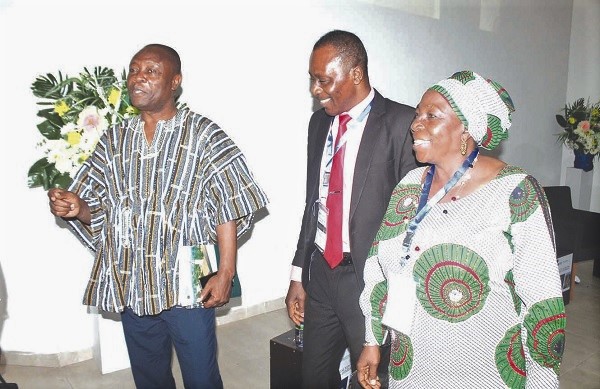
Develop policies to attract students to sciences— Prof. Adinkrah-Appiah
The Vice-Chancellor of the Sunyani Technical University (STU), Professor Kwadwo Adinkrah-Appiah, has appealed to the government to develop a deliberate policy that prepares students at the basic level to take up science, technology and engineering programmes at the tertiary level.
He contended that if the students entered tertiary institutions with qualifications that did not allow them to read science, technology and engineering programmes, "we cannot do much."
Human resource development
"So, we need to go back to the basics and put in place deliberate policies to get the children to develop the appetite for science-related programmes to qualify them to read such programmes at the tertiary level," Prof. Adinkrah-Appiah proposed at the ongoing 71st New Year School and Conference at the University of Ghana, Legon.
He was speaking in a panel discussion on the topic, "Ghana Beyond Aid: Human Capital Development, Research and other innovations."
Prof. Adinkrah-Appiah expressed concerns that polytechnics and technical universities were always accused of running more humanity programme, stressing that even though the STU had more science, technology and engineering as well as technical vocational education training (TVET) programmes, it was still struggling to get students into those programmes.
"But the few business programmes that we introduced, you see the number of students coming for that direction and of course, because we also need internally generated funds to run the system, we pick them," he explained.
Deliberate move
"So, we really need a deliberate effort to make sure that majority of our students qualify to read the science-related programmes," he said, adding that if the student was not good in Mathematics, he or she could not read engineering or any of the science-related programmes.
He said there should be a policy direction that would create incentives to attract the youth into such programmes and there should be a deliberate effort to push majority of the youth into the engineering, science and technology field.
Focus of technical universities
He said technical universities had positioned themselves to equip their students with the relevant practical skills, “because we do not want graduates to be embarrassed on the field, before you go out of school, you have the opportunity of going to industry to work to have the practical aspects so that industry will not spend much resources on you when you complete and join them.
“Sometimes we think it is only the government's responsibility but industry has to pay attention to practical training. They must give opportunity for internship for our students so that when they join them later such industries will not spend time and money to retrain them on the practical aspects,” he stated.
Prof. Adinkrah-Appiah said as technical universities, they were focusing on training and developing expertise in the construction industry such as plumbing, welding and tiling, adding that individuals who wanted quality work had to hire people from Lome, Togo to perform such duties.
He said in the automobile industry, “we want to train auto mechanics, car manufacturers and my vision is to make sure that in the next 10 years, we will lead in the area of electric car manufacturing in Ghana. We mean it and we are very serious with that.”
Prof. Adinkrah-Appiah noted that electrical and electronic engineering industry and artificial intelligence were the areas the country needed to focus on, “because that is where the world is moving and Ghana must join.”
He said if Ghana was serious at not going for aid anymore, then, “we need to develop our local content,” and the area to focus on was the development of the human capital.
